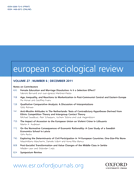-
Views
-
Cite
Cite
Michael Savelkoul, Peer Scheepers, Jochem Tolsma, Louk Hagendoorn, Anti-Muslim Attitudes in The Netherlands: Tests of Contradictory Hypotheses Derived from Ethnic Competition Theory and Intergroup Contact Theory, European Sociological Review, Volume 27, Issue 6, December 2011, Pages 741–758, https://doi.org/10.1093/esr/jcq035
Close - Share Icon Share
Abstract
In this study, we set out to explain anti-Muslim attitudes in the Netherlands. Although the presence and immigration of Muslims have become widely discussed, there is little systematic evidence about the determinants underlying anti-Muslim attitudes. Using data from the Social and Cultural Developments in the Netherlands (SOCON) survey (2005, 2006), containing a more detailed measurement of anti-Muslim attitudes, we tested two contradictory mechanisms, derived from ethnic competition theory and intergroup contact theory. Results from hierarchical structural equation modelling indicate that the relative outgroup size induces both intergroup friendship contact as well as perceptions of ethnic threat. However, only the latter turned out to affect anti-Muslim attitudes directly. Moreover, our findings revealed that contact with colleagues belonging to ethnic minority groups reduces negative attitudes towards Muslims and mediates the effect of individual-level determinants on anti-Muslim attitudes. The complementary nature of both ethnic competition theory and intergroup contact theory is illustrated by negative correlation between both mediating mechanisms, as well as the support for a curvilinear relationship between outgroup size and perceived ethnic threat.



